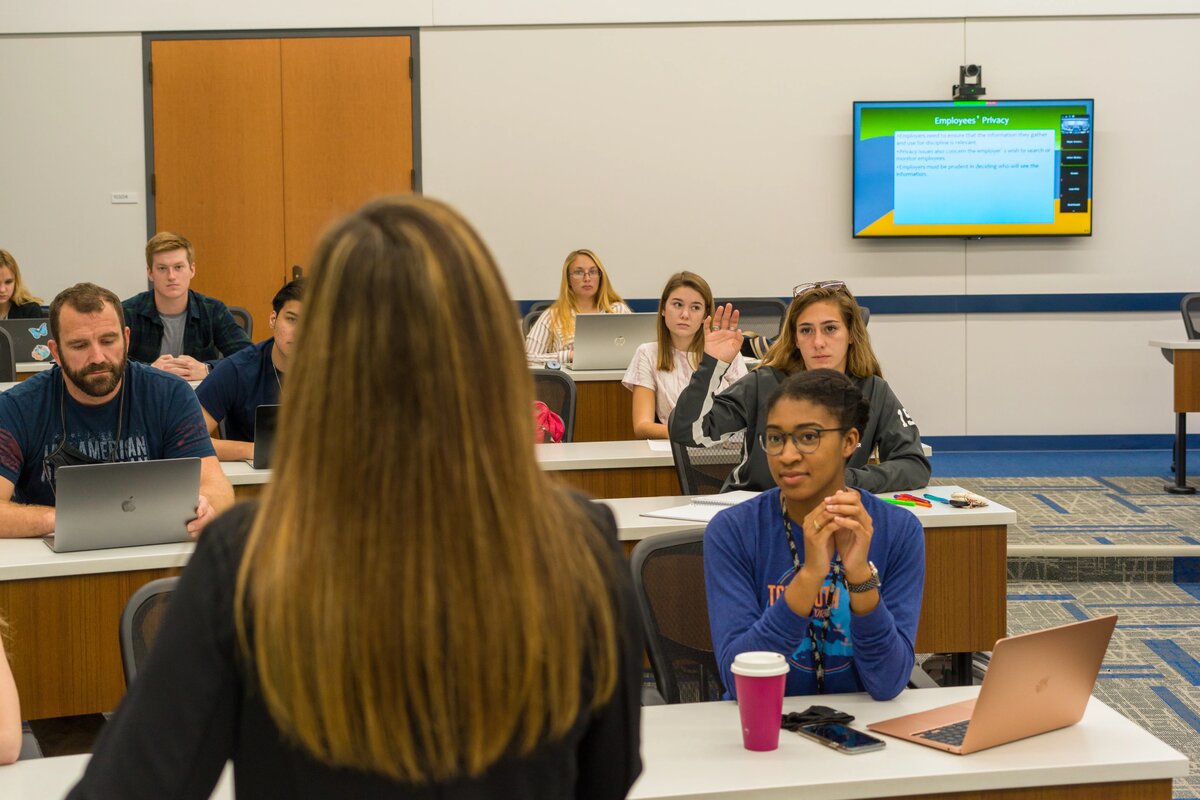Working with Newly Matriculated Undergraduate Students
Written By Dr. Colleen Swain - Associate Provost for Academic Success and Dean of Undergraduate Studies, Professor of Education
New students to UT Tyler often experience considerable academic and culture shock. Our new first-year and transfer students enter UT Tyler with vastly different prior educational experiences than what they experience at UT Tyler. This gap in expectations from previous experiences to UT Tyler is one of the primary reasons we see low grades in their first semester with our newly matriculated students. Our newly matriculated undergraduate students are in what is known in research as students in transition, and it is one of the highest-risk situations students will find themselves in during their undergraduate careers. Decades of research findings studying newly matriculated undergraduate students guide us in helping our new students overcome academic and culture shock. One of the most important factors to consider is time. Students determine whether college is worthwhile in the first six weeks.
What is UT Tyler doing that aligns with this research?

1. Creating college and university-wide first-year seminars for students. In the Fall term, students take a zero-credit seminar in their college. This enables students to meet students from majors within their college. In the spring term, students participate in a UNIV seminar, which allows them to meet students from across the University. Academic Success and Student Success (Student Affairs) staff teach these classes. Within the seminars, there are opportunities for students to get to know their peers, learn how to access the academic, financial, social, physical, career, and mental health resources available to them, better understand how to be a successful college student through time management, and develop research-based academic practices that facilitate learning and retrieval processes along with learning how to go through their degree program and life with a growth mindset.
2. First-Month Alerts allow faculty to provide Academic Success staff a red, yellow, or green concern level about each new student. This allows Academic Success staff and advisors to triage the notes from faculty, connect students to resources, and begin interventions with them. Having this first-month alert occur during the first four weeks of the term enables us to work with them before they determine their college-worthiness.
3. All new undergraduates participate in a face-to-face or online orientation before starting classes or within the first six weeks of the term. This enables multiple teams of support staff to help students set realistic expectations about their academic experience at UT Tyler.
What can you do as a faculty member to help newly matriculated undergraduates?

1. Although you might not think of yourself as scary, to many students, you are. Share personal things about yourself so you can be seen as a “regular” person and make it more comfortable for students to approach you.
2. Make an effort to meet your students and learn something about them. I meet with each of my students, and they can pick whether they want that to be in person or via Zoom. With large classes, I might have students sign up for times in slots of three so I can get to know them, and they also meet other students in their class. Find out what is important or interesting to students, as this could help you craft examples that fit students’ needs and interests. This research also shows that if students feel like one faculty member knows their name and could even possibly write a recommendation letter, they start building a strong sense of belonging to the University.
3. Don’t assume that students know what you mean by terms such as office hours or understand that we expect citations to literature/research with all papers. Be explicit and carefully spell out precisely what you want students to do and how you want to help them. Seek insight from an upper-level student on the instructions for your assignments. Other students can tell you when new students might get confused. We have the cultural capital for college, but many of our students do not. (Remember that 21% of our Fall 2024 students identified as first-generation students. We know this is more as many students don’t know whether they are first-generation students. In addition, 42% of our Fall 2024 cohort are Pell Eligible.)
4. Honor the prior experiences that students bring to your class. We are all shaped by our lived experiences, so speaking negatively of different educational experiences is interpreted as you thinking poorly of them. We can learn something from all our students to make us better teachers.
5. Build opportunities within your course where students can practice their new knowledge without penalty. We talk about making mistakes is part of the learning process (and research shows us it is). However, if we don’t provide students with low-stakes opportunities to practice their new knowledge, we ask them to be strong or perfect when initially learning the material. That is not how we help students make this academic shift. Build in self-graded “Check Your Understanding” activities or low-stakes quizzes. Allow students to correct misconceptions before assignments that are heavily weighted. This also helps students perform better on those first college assessments that are often major stumbling blocks for students.
6. Remind students that in college, they do not have as much instructor interaction as they did in high school. They might not have needed to study as much because they were engaged in more seat time with their teachers. However, now they are learning twice the amount of material with only 1/3 of the time with their instructor. Encourage them to practice the research-based study and retrieval strategies they learned in their seminar courses.
You play a significant role in the success of our newly matriculated undergraduates. How you interact with them and structure your course is crucial to their success. If you’re interested in other ways to help our students, consider the following resources:
- Watch Stephen Chew’s How to Fail at College videos (YouTube)
- Read Kathleen Gabriel’s book Teaching Unprepared Students: Strategies for Promoting Success and Retention in Higher Education
- Read Tim Elmore’s book, Marching Off the Map: Inspire Students to Navigate a Brand New World
- Explore Pooja Agarwal’s website, RetrievalPractice.org